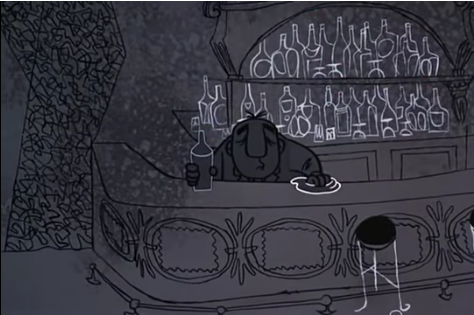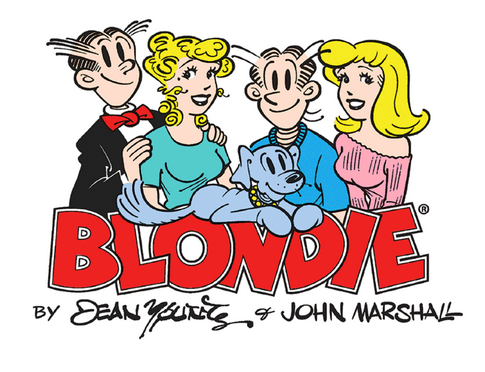CSotD: Thoughts both deep and not-so-much
Skip to comments
I hope the dog is resting comfortably, because one of us ought to be and the time shift from East to West has really caught up with me. I’m putting off convention coverage for another day and it should be a long one, since I’ve got a red eye tonight and won’t post tomorrow until noon or so.
As for the dog in Speedbump (Creators), I’m lucky to have a small one who curls up at my side, because I’ve had large sprawlers and when they rest comfortably, you don’t. When my boys were teens, we had a ridgeback who would get between boy and wall, then plant his feet on the wall and straighten his legs. I’d hear the thump of the kid hitting the floor and the string of curses that followed.
Good thing he was loveable during the day.

My college years were in the midst of the singer/songwriter period, so we all wrote songs and played them in the campus coffeehouse. Andertoons (AMS) recreates it well, because the introductions were often longer than the songs.
Even if it wasn’t an original, we’d feel compelled to give a long explanation of why we’d chosen it and what it meant to us, which I later learned doesn’t matter to the audience. But at 19, what it meant to me was pretty much all it meant.
My first time on stage, I’d carefully timed out my 20 minute set. Except for the introductions. Finally, I peered through the glare of the spotlight and saw someone in the back of the room jumping up and down and making “Cut it!” gestures. I’d gone 40.
Of course, at that point in my career, the introductions were better than the music.

My mistakes were generally loud, perhaps, as Frazz (AMS) suggests, because they weren’t sufficiently rehearsed, but at that age nothing I did had been rehearsed.
But since that’s true for everyone, I agree with his advice: Go ahead and speak up. You can’t possibly sound more foolish than your contemporaries, and it will be good practice.
The companion bit of advice is that nobody is really paying attention anyway, so it doesn’t really matter. They’re too fixated on worrying about whether they’re looking foolish to notice if you are.
Go for it.

And as noted in today’s Candorville (KFS), that continues well past adolescence. It’s not so much that nobody is paying attention as it is that you can’t predict who is and who isn’t. It can be deflating to find out who isn’t, but, then again, it can be a kick to find out that someone unexpected is.
Though the best policy is probably just to keep on keepin’ on and let that stuff sort itself out. Most of it doesn’t matter much anyway, so focus on the few things that do.

Arlo and Janis (AMS) suggest that most of the people who attract attention need attention and “influencers” are just spokesmodels who have found a lucrative way to be a spokesmodel.
It’s a good gig to get paid for living out your compulsions, though there’s surely a letdown when your moment in the sun fades, as such things nearly always do.

And, on the topic of hucksters, Rabbits Against Magic (AMS) raises the question of why we need lab-grown meat, given that a fair number of people live without the regular kind either.
I understand, mind you, that lab-grown meat means we don’t need acres and acres of cattle feed, but I find it hard to believe that the process is all that environmentally neutral, either. And if we free up that farmland — and maybe quit growing corn to help run our vehicles — it seems we could feed a lot of people the old-fashioned way.
Though, as he suggests, there’s profits in the new-fashioned way.
Jonathan Lemon, creator of Rabbits Against Magic, was at the AAEC Convention, which interested me because his strip runs on the funny pages but often touches on political topics. He’s not the only one.

Pearls Before Swine (AMS) is overtly political this morning, and good for him. I like political cartoons, but they probably appeal to people who are already politically engaged and read the editorial page.
As strippers begin to drop these little bomblets on the funny pages, they’re almost certainly reaching people who don’t see the editorials, but they normalize political opinions. It makes paying attention to this stuff something you don’t have to be deeply engaged to do, and nibbles away at the uninvolved who could make a difference.
As for the artists, it’s not just a matter of deciding to become more active in helping to shape opinion. Whatever road you take, you’ve made a decision: Either you’ve decided to engage, or you’ve decided not to.
You’ve already committed to getting people’s attention. It’s just a matter of what you plan to do with it: Keep them placidly asleep, or give them things to think about.
Today’s Frazz isn’t political, today’s Pearls is, but they’re both geared to making people more aware.

Nothing wrong with thinking. Never has been. Don’t just sit.


Comments 6
Comments are closed.